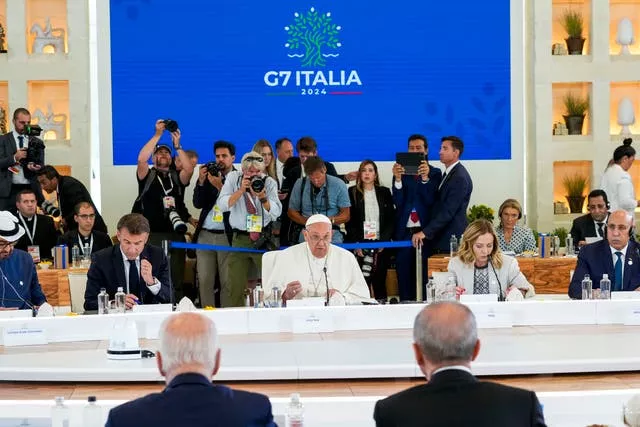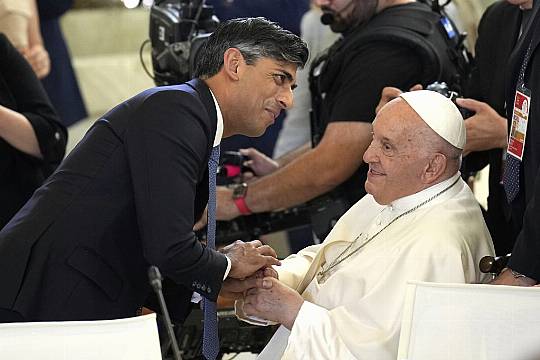Pope Francis has become the first pontiff to address the G7, raising the promise and perils of artificial intelligence (AI) before the leaders of the world’s leading industrialised nations.
Francis addressed the group and other invited countries at their annual summit in southern Italy.
When he arrived, the room, which had been boisterous with delegations, went quiet as he greeted each of the G7 members and the expanded guest list.

Francis used the occasion to join the chorus of countries and global bodies pushing for stronger safeguards on AI following the boom in generative artificial intelligence kickstarted by OpenAI’s ChatGPT.
He challenged leaders of the world’s wealthy democracies to keep human dignity foremost in developing and using AI, warning that such powerful technology risks turning human relations themselves into mere algorithms.
Francis said politicians must take the lead in making AI human-centric, so that human decisions always remain made by humans, and not machines.

“We would condemn humanity to a future without hope if we took away people’s ability to make decisions about themselves and their lives, by dooming them to depend on the choices of machines,” he said.
“We need to ensure and safeguard a space for proper human control over the choices made by artificial intelligence programmes: Human dignity itself depends on it.”
The Argentine pope used his annual peace message this year to call for an international treaty to ensure AI is developed and used ethically. He argues that a technology lacking human values of compassion, mercy, morality and forgiveness is too perilous to develop unchecked.
I met with @Pontifex and thanked His Holiness for his prayers for peace in Ukraine, his spiritual closeness to our people, and humanitarian aid for Ukrainians.
I informed the Pope about the consequences of Russian aggression, its air terror, and the difficult energy situation.… pic.twitter.com/MHhgrzbRZG— Volodymyr Zelenskyy / Володимир Зеленський (@ZelenskyyUa) June 14, 2024
At the summit itself, G7 leaders turned their attention to migration at the start of the second day, seeking ways to combat trafficking and increase investment in countries from where migrants start out on often life-threatening journeys.
The gathering in a luxury resort in Italy’s southern Puglia region is also discussing other major topics, such as financial support for Ukraine, the war in Gaza, artificial intelligence, climate change, as well as China’s industrial policy and economic security.
But some divisions also appeared to emerge over the wording of the summit’s final declaration, with disagreement reported over the inclusion of a reference to abortion.

Migration is of particular interest to summit host Italy, which lies on one of the major routes into the European Union for people fleeing war and poverty in Africa, the Middle East and Asia.
Right-wing Italian premier Giorgia Meloni, known for her hard-line stance on the issue, has been eager to increase investment and funding for African nations as a means of reducing migratory pressure on Europe.
Italy “wanted to dedicate ample space to another continent that is fundamental to the future of all of us, which is Africa, with its difficulties, its opportunities,” Ms Meloni said at the summit opening on Thursday.
“Linked to Africa, and not only to Africa, there is another fundamental issue that Italy has placed at the centre of the presidency, which is the issue of migration, the increasingly worrying role that trafficking organisations are assuming, clearly exploiting the desperation of human beings,” she said.
Ms Meloni has a controversial five-year deal with neighbouring Albania for the Balkan country to host thousands of asylum-seekers while Italy processes their claims.

She has also spearheaded the “Mattei Plan” for Africa, a continentwide strategy to increase economic opportunities at home and so discourage migration to Europe.
More than 22,000 people have arrived in Italy by sea so far in 2024, according to UNHCR figures. In 2023, more than 157,000 arrived, and nearly 2,000 died or went missing while attempting the perilous Mediterranean crossing.
The United States has also been struggling with a growing number of migrants at its southern border.
US President Joe Biden introduced new policies to curb migration after a bill he tried to get through congress failed to pass.
However, immigrant rights advocates filed lawsuits on Thursday over the new policies, and it is unclear whether they will be able to withstand the legal challenges in the US courts.
Tackling migration “is a common challenge,” European Council President Charles Michel said after arriving at the summit.

“This is the route that we intend, together with our partners, to put in place: this coalition to fight against the smugglers, these criminal groups which are abusing (vulnerable people) to make money and to destabilize regions and countries across the world,” he added.
G7 leaders say they will launch a “coalition” designed to counter migrant smuggling by boosting the investigative capacities of countries of origin, transit and destination.
In a draft statement seen by the Associated Press, G7 leaders say they will work to improve “reliable data exchanges” between countries that are crucial for joint enforcement actions against smuggling and trafficking networks.
The draft said the G7 will utilise a “follow the money” approach to identify, investigate and disrupt organised crime while enhancing co-operation on seizing criminal assets.
According to the draft statement set to be released at Saturday’s conclusion of the summit, these steps are part of a three-pronged approach to tackling migration.
That approach includes getting to the root causes of irregular migration and remedying them through “sustainable development initiatives, economic investment and stabilisation efforts.”
The G7 will also work to “support the safe and dignified return of persons not eligible to remain” in third countries as well as to support “sustainable reintegration efforts in countries of origin.”
The G7 will also foster regular pathways to migration that “need to respond to national requirements, adhere to our legislations, sovereign decisions, and to the principles of fair recruitment.
At the same time, initiatives establishing these pathways should take into account the “needs of vulnerable populations and employ gender and age-sensitive approaches” to prevent abuse and exploitation.
Apart from the G7 nations of Canada, France, Germany, Italy, Japan, the UK and the US, the Italian hosts have also invited several African leaders – Algerian President Abdelmadjid Tebboune, Kenyan President William Ruto and Tunisian President Kais Saied – to press Ms Meloni’s migration and development initiatives.
Other invitees include Ukrainian President Volodymyr Zelensky, Brazilian leader Luiz Inacio Lula da Silva, Indian Prime Minister Narendra Modi and Turkish President Recep Tayyip Erdogan.
The summit opened on Thursday with a strong show of support for Kyiv, with an agreement reached on a US proposal to back a 50 billion dollar (£39 billion) loan to Ukraine using frozen Russian assets as collateral.
Russian President Vladimir Putin denounced the freezing of Russian assets as “theft” and vowed it “will not go unpunished”.







